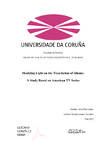Shedding Light on the Translation of Idioms: A Study Based on American TV Series

Use este enlace para citar
http://hdl.handle.net/2183/34196Coleccións
Metadatos
Mostrar o rexistro completo do ítemTítulo
Shedding Light on the Translation of Idioms: A Study Based on American TV SeriesAutor(es)
Director(es)
Lezcano, EmmaData
2023Centro/Dpto/Entidade
Universidade da Coruña. Facultade de FiloloxíaDescrición
Traballo fin de grao (UDC.FIL). Inglés: estudios lingüísticos y literarios. Curso 2022/2023Resumo
[Abstract] In recent years, experts in the field of Translation have become interested in idioms, as they
represent a significant challenge in the search for correspondence between the source and target
language. It has been shown that equivalence can be total, partial, or null and that different
strategies such as substitution, paraphrasing and literal translation are used. The main aim of
this work is to demonstrate the difficulties faced by translators with idiomatic expressions. For
this purpose, I have selected several idioms from eight American series released in different
years, and I have paid special attention to the Spanish subtitles. Besides, it has been essential to
consult different bibliographic sources to learn more about the characteristics of this type of
expressions, as well as the strategies used for their interpretation. In this way, I analyse the
suitability of translations and suggest other possible alternatives on some occasions.
As for the results, although there are many cases of full equivalence in which literal translation
is used because of cultural and social factors, my research shows that partial equivalence is the
most frequent and that the translation methods par excellence are substitution and paraphrasing.
In addition, two groups can be distinguished: those which have an image of the same domain
and those whose image differs in the semantic field. For the first group, the examples analysed
correspond to the substitution strategy whereby the translator not only retains the same term
—or at least one from the same domain— but also preserves the metaphorical character of the
idiomatic expression. Furthermore, a curious aspect I have observed is that there is a wide
variety composed of nouns related to different parts of the human body to express a figurative
sense. As for idioms whose image differs in the semantic field, the examples presented
correspond to the use of the strategies of substitution and paraphrase. Through the latter, the
translator expresses the meaning in a more direct way, but the figurative sense is lost. Besides,
some special cases have been presented where no idiomatic phrases are used in L1, but wherethe message is translated using them into L2, and also an example that illustrates the difficulty
that can arise when translating certain idioms, as sometimes there is no option in English that
fully captures the meaning of the original.
Therefore, this paper highlights the difficult task of translators who must have a great
knowledge of both languages, that is, master them to perfection in order to make the translation
as effective, efficient and appropriate to the situational context as possible.
Palabras chave
Idioms
Cross-linguistic research
Translation strategies
Series
Subtitles.
Cross-linguistic research
Translation strategies
Series
Subtitles.
Dereitos
Os titulares dos dereitos de propiedade intelectual autorizan a visualización do contido deste traballo a través de Internet, así como a súa reproducción, gravación en soporte informático ou impresión para o seu uso privado e/ou con fins de estudo e de investigación. En nengún caso se permite o uso lucrativo deste documento. Estos dereitos afectan tanto ó resumo do traballo como o seu contido Los titulares de los derechos de propiedad intelectual autorizan la visualización del contenido de este trabajo a través de Internet, así como su repoducción, grabación en soporte informático o impresión para su uso privado o con fines de investigación. En ningún caso se permite el uso lucrativo de este documento. Estos derechos afectan tanto al resumen del trabajo como a su contenido





